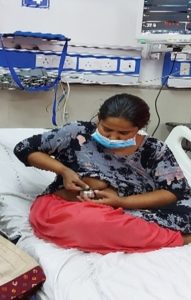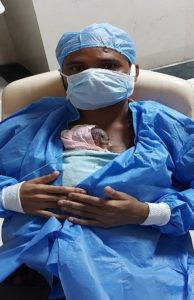A Story of True Grit

Salma, 33-year-old mother of two boys aged 6 and 8 years old, has had chronic kidney disease for the last two years. She was prescribed steroids and immunosuppressant therapy; she stopped on her own after some symptomatic improvement after she took them for only six months.
She and her husband live in a joint family with her in-laws, three sisters, and brother-in-law in a village in Uttar Pradesh about 800 kilometers away from Delhi, where she and her baby are currently admitted for treatment at Dr. Ram Manohar Lohia (RML) Hospital. They live in a one-room house with a toilet facility. The family does not have any farming land. Her husband is a plumber by profession. He used to earn about Rs 10-15000 per month but has been unemployed since March 2020, initially due to nation-wide lockdown in the wake of the COVID-19 pandemic. Now he is jobless because he is spending wakeful nights for the last two months by the side of his sick wife in the hospital, and running up and down to the NICU where their little baby is admitted.
Salma was admitted while pregnant with twins to JJ hospital, Mumbai, about five months ago. She was diagnosed with anasarca (whole body swelling) and hypertension; she was treated conservatively and discharged after 15 days of hospitalization with some improvement.
Salma was readmitted about two months later at RML hospital, New Delhi, to the nephrology department with kidney failure, anasarca, hypertension and infection, where she was initiated on hemodialysis. In the wake of intrauterine demise (stillbirth) of one of the twins and severe growth restriction of the other twin, and her own multiple medical problems, her pregnancy had to be terminated at 30 weeks (normal full-term pregnancy is 40 weeks) by emergency Cesarean. She gave birth to an extremely low birth weight preterm male baby weighing merely 640 grams (the average birth weight of a newborn is around 3000 grams). He had a grim chance of survival, or else a stormy few months ahead before he could be fit for discharge if he did make it.
The baby has been sick and managed in the NICU, and has done reasonably well after about four weeks of life outside his mother’s womb. Salma and her family were counselled regarding the importance of exclusive breastmilk for such extreme preterm babies. Despite being on hemodialysis and the physical, mental, financial and family stress, she had courage and motivation to continuously express and nourish her little one with her own milk to date. When Salma was not in the physical condition to express her milk, the mother-in-law did it for her. Somehow, the family has managed to send breast milk through the father for their little one, at least eight to ten times throughout the day. The grandmother said, “We did not waste even a drop of mother’s milk. We sent whatever we could collect and took care to send, even the few drops of colostrum initially that we were able to manage!” When asked how they manage this, Salma proudly thanks the unstinting support she has received from her mother-in-law and her husband. The baby was never fed formula, not even for a single feed. Recently, the father has also become involved in giving kangaroo mother care (KMC) to his son.

We must say, the little one has been blessed to be cared for so much. Intrigued and amazed, we couldn’t hold back from sensitively eliciting from each of the adults of the family whether the ‘special consideration’ for this baby was because he was a boy child and not a girl. This is relevant because gender discrimination favoring a male child versus a female child is a common occurrence in all classes of strata, especially from some of the states of India, including Uttar Pradesh. To this, each of them answered very clearly, “Sirjee, this time we were looking forward to having a girl child as we already have two boys!”
When we asked Salma what kept her going, she fully credits her husband and mother-in-law and conceded, “they motivated me throughout.” While her mother-in-law expressed every two hours religiously from Salma’s breasts, the father most punctually carried and delivered this precious ‘Amrit bowl’ to the nursery even through the late hours of night. Her husband and mother-in-law have been taking turns to rest and sleep on a bench outside the ward in the attendant waiting area. However, they have never begrudged her and when asked about their health care experience they make us proud by ‘praising from heart’ the treating departments of both baby and mother. The baby has a long way to go before his discharge can be contemplated, but on the bright side, his mother will be discharged and we expect her to actively participate in the care of her preterm newborn.
Through this story, we wanted to demonstrate how a mother can provide exclusive breastmilk for her baby even in the most daunting circumstances. We hope cases like this can act as a source of inspiration for mothers who deliver preterm, so no baby lacks the benefits of exclusive breastmilk.
Acknowledgement: The Authors would like to give special acknowledgement to the department of Nephrology, ABVIMS and Dr. RML Hospital, New Delhi, India for their care and cooperation.
Learn more about breastfeeding and feeding of small and sick newborns.